
This parent guide supports parents in helping their child at home with the 8th grade Science content.
- Subject:
- Science
- Material Type:
- Reference Material
- Vocabulary
- Author:
- Kelly Rawlston
- Letoria Lewis
- Date Added:
- 10/11/2022

This parent guide supports parents in helping their child at home with the 8th grade Science content.

This resource accompanies our Rethink 8th Grade Science course. It includes ideas for use, ways to support exceptional children, ways to extend learning, digital resources and tools, tips for supporting English Language Learners and students with visual and hearing impairments. There are also ideas for offline learning.

This interactive activity demonstrates and provides explanation for how acid rain affects aquatic ecosystems and how certain species react to decreased water quality as pH becomes lower. The activity also explains the pH scale as a measure of acidity.
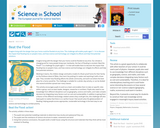
In this lesson, students discover the impact that flooding has on people's lives, and how science and technology can mitigate its effects and help find potential solutions. Working in teams, students design and build a model of a flood-proof home for their family on the fictitious isalnd of Watu. They will consider how flooding affects the whole community and work out where the best place for a home would be.

This lesson plan demonstrates how microorganisms normally found in environments, such as the bottom of warm freshwater ponds and lakes can cause illness when they enter the human body. Students engaged in this lesson plan will learn about N. fowleri (the scientific name of the brain-eating ameba), where it lives, how it can cause infection, and how persons can protect themselves from this infection.Students will also have the opportunity to identify other organisms living in local freshwater reservoirs, such as ponds and lakes. At the end of the lesson, students should have an enhanced understanding of the environment's role in disease transmission and ways to reduce the risk for contracting waterborne infections.
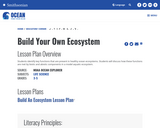
Students will create a model aquatic ecosystem and make regular observations over a period of time. They will also work collaboratively to conduct research on common ocean health issues and summarize their findings in a written report.

In this activity, students read a scenario describing an outbreak of illness among fishermen working along the Eastern Shore of the Chesapeake Bay. Then students will describe and develop an investigation that could be conducted to resolve the issue.
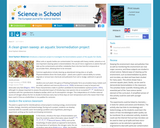
Students are introduced to the topic of bioremediation and collect information about Azolla, such as the morphology of water plants as opposed to land plants, the importance of symbiosis, the nitrogen cycle, the use of Azolla in agriculture, and Azolla’s ability to absorb heavy metals. Students formulate the research questions and hypotheses that they would like to investigate. Possible topics include measuring the gain in biomass depending on growth conditions (e.g. CO2 level, iron level in the water, amount of light), or the effect of Azolla on water quality.

This lesson challenges students to create and test a water filtering system.
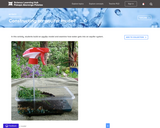
Students build an aquifer model and examine how water gets into an aquifer system.
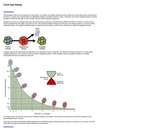
In this simulation activity, students take virtual coral samples and use radiometirc dating techniques to calculate the age of the living and dead corals in the sample area. They will then use this information to determine the environmental conditions on the seamount.
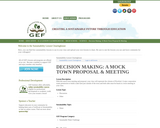
Students will gain experience in recognizing potential hazards to a community's water supply and weighing the risks and benefits of community development, and will practice decision-making skills in a mock town meeting.

This video explores the pros and cons of desalination. A set of discussion questions and post-viewing activities are provided.

In this lesson, students will learn about the scientific method and the characteristics of life by assuming the role of epidemiologists. The scenario that they will investigate is that many individuals in the school have recently become ill with gastrointestinal symptoms (vomiting, diarrhea, dehydration, and headache). Students will discover the source of the illness, the microbe causing the illness, and the biology behind the organism spreading the disease. By examining stool samples made from molasses and water, students will examine differences between affected and unaffected individuals. The students will eventually determine the source of the outbreak is contaminated water in the school cafeteria and conclude that the microbe involved is a bacterium called cholera. Students will then conclude the lesson by investigating an outbreak of birth defects.

In this activity, students make a model watershed and "rain" over the model. In the process, they will learn how water moves in a watershed and why it is important to keep a watershed healthy.
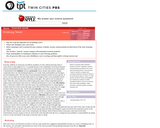
Students learn about drinking water - where it comes from, why and how it is treated before municpal use, and how ocean water distillation may be used to alleviate water shortage problems in some communities. In an associated activity, students will build a device to distill seawater to create drinking water and discover some of the costs associated with producing freshwater from the sea.
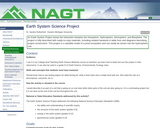
Students will construct an ecocolumn and use it to study the interaction between the geosphere, hydrosphere, atmosphere, and biosphere.

In this lesson, students gain a visual perspective on global water distribution and average U.S. water consumption. Students will understand the limited supply of fresh water that exists on the earth and explore the need for not polluting and conserving our fresh water supply.
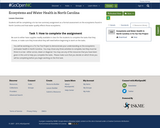
Students will be completing a tic-tac-toe summary assignment as a formal assessment on the ecosystems found in North Carolina and how water quality effects those ecosystems.
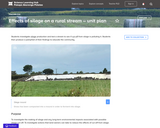
In this activity, students investigate silage production and test a stream to see if run-off from silage is polluting it. Students then produce a pamphlet of their findings to educate the community.